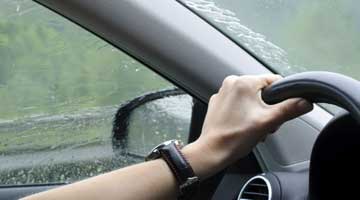As the temperature drops and the dark nights draw in, you rely on your van more than ever to get you safely from A to B. However, the onset of a season of heavy rain, snow and freezing conditions can wreak havoc on the health of your vehicle and exacerbate any underlying issues – which could bring your plans to an unexpected stop if your van gives up the ghost and breaks down.
And there’s no doubt about it: winter is coming. Some forecasters have predicted that this could be the coldest British winter in 8 years, so you don’t want to be left stranded by the roadside if your van comes to a standstill.
Thankfully, there are many easy, preventative steps you can take before you hit the highway to help your van run without a hitch in the winter months.
From keeping your vehicle spick and span to keeping a keen eye on coolant levels, we’ve rounded up ten of our top tricks to help keep your motor running throughout the winter gloom and beyond.
Depend on de-icer
There’s nothing worse than running out the door during the morning rush and seeing that your van has completely frosted over – especially when time is of the essence. To help minimise stress, keep de-icer and a scraper in your van to help de-ice your windscreen on particularly wintry mornings. Do your locks tend to freeze up? Carry a lock de-icer in your vehicle or try warming your key before entry to help clear them.
Keep your van spick and span
Your screenwash needs to work a lot harder to keep your windscreen crystal clear. To help with this, top your van up with a higher concentrate of screenwash – ideally one that works effectively in temperatures up to -15 degrees – to prevent the water from freezing when you need it most. Keep in mind that you’ll probably be using your screenwash more frequently in the winter months, so perform weekly checks and fill up when needed.
The amount of dirt, grit and grime your van is exposed to increases in the winter months and the salt used to de-ice can cause its bodywork to corrode. Although it’s typically a task for the summer, try to pay regular visits to your local carwash or showcase your own cleaning skills to ensure your Christmas tree isn’t the only thing that stays looking extra sparkly this winter.
Review your window wipers
Don’t throw caution to the wind, keep your wipers in tip-top condition to help give you a clear view of obstacles in front of you. Looking for signs your wipers may need replaced? Check your front and back windscreen wipers for splits, cracks as well as other tell-tale signs of wear and tear including streaking when clearing rainwater, scraping, squeaking noises and irregular movement when in use.
Remember, if there’s been heavy snowfall or your wipers are frozen to your windscreen, don’t turn your wipers on – and ensure that any auto wiper control is deactivated – as these additional strains could blow out the wiper control fuse, leaving you stranded and out of pocket.
Get to grips with your tyres
If the tread of your tyres is worn down or frayed, they will be less effective when gripping the road, which is essential to safe driving in rain, snow and ice. As the winter weather worsens, check your van’s tyres are the recommended legal tyre tread depth. Although the minimum is 1.6mm, it’s recommended that your van has a minimum tread depth of 3mm in winter months to help improve traction.
Be sure to look out for signs of general wear and tear, such as splits and bulges, and replace as necessary. Pay close attention to your tyre pressure too. If they’re looking a little flat, consult your van’s handbook and pump them up to the appropriate levels as this could help reduce friction levels when they come into contact with the road and increase your van’s fuel efficiency.
If you live in an area that’s likely to be badly affected by snowfall, it may be wise to change to winter tyres with a deeper tread or employing snow socks to help you navigate the roads safely when the temperature plummets.
Seek professional help
Arranging to get your van serviced is a simple but effective step you can take before winter weather hits hard. Not only could trusted professionals help stop problems in their tracks, they can also alert you to potential danger issues to look out for and how to solve them to prevent your van from breaking down in the future.
Look out for low oil levels
68% of drivers in a recent study were unsure of how to change the oil in their cars, with 8% said didn’t know how to even check the oil level. At a minimum, low oil levels can result in an inconvenient breakdown, but at their worst they can completely devastate engines, rendering vehicles unfit for the road.
To prevent unnecessary damage and keep your van in slick working order, ensure your oil level is between the minimum and maximum marker on your van’s dipstick and top up as required. Take care not to overfill your vehicle with oil as this can be also result in devastating damage. Make sure to consult your owner’s handbook to ensure you’re topping up with the appropriate oil.
Keep an eye on coolant levels
When it’s freezing cold outside, the last thing you want is your van overheating due to low coolant levels, leaving you stranded by the roadside. Although the coolant system tends to be sealed and very rarely needs to be topped up, it’s a good idea to give it a second glance every few weeks and prior to long road trips as it could help stop potential problems from worsening. Always consult your handbook for the appropriate coolant and ensure your engine is cool before attempting to top up. If you’re unsure in any way, always seek professional advice.
Keep it illuminated
Lights help your van stand out and avoid obstacles in the darkness during the winter months, so as the days get shorter, take some time to inspect your vehicle and ensure that everything that should be illuminated is as bright as it can be. Make sure to replace any blown bulbs prior to setting off, otherwise you could be presented with a vehicle defect rectification notice, or worse, a fine, if you’re stopped by the police.
Stay in charge of battery health
Getting caught out by a flat battery can be a real negative, so keep things positive by performing routine checks of your van’s battery health. To ensure things are performing at full capacity, check battery terminals are tight and spend time cleaning off any signs of corrosion with hot water and petroleum jelly. Afterwards, check your vehicle’s manual to ensure you’re using the correct leads and follow these steps if you want to have a go at charging your car yourself.
If you’ve carried out these checks and charges but your van still struggles to kick into life when you turn the key, you may need to get it checked out by a professional – which could be an ideal opportunity to carry out some TLC on your vehicle’s electrical health.
Keep in mind that battery lifespans only tend to last a maximum of four years so you may have to fork out for a replacement in the worst-case scenario.
Prepare for the worst
No matter how many preventative steps you put in place, sometimes breakdowns are unavoidable. But don’t fret, you can still be extra-prepared when you come to an unexpected standstill by gearing up your van with an emergency kit. A winter emergency kit worth its salt could include:
- First aid kit
- Hi-vis vest (to make you more visible)
- Warning triangle
- A wind-up torch so you don’t run out of battery
- Warm, waterproof clothing and blankets
- Jump leads
- Bottles of drinking water and non-perishable food
- Shovel
- Mobile phone charger
- Spare screenwash, de-icer and a scraper
You may not be able to prepare for every probability but packing a winter breakdown kit could help keep your stress levels to a minimum, helping to concentrate more fully on getting your van back on the road.
Preparation is key when it comes to weather-proofing your van against the winter chill and these preventative steps could help safeguard you from the stress of your van breaking down unexpectedly. But preparing your van is only half the battle when it comes to staying safe on the roads during the winter months.
Covering freezing conditions and high winds to heavy rain and snowfall, read our guide on how to drive your van safely in winter to help prepare you for whatever conditions the Great British weather throws at you.






